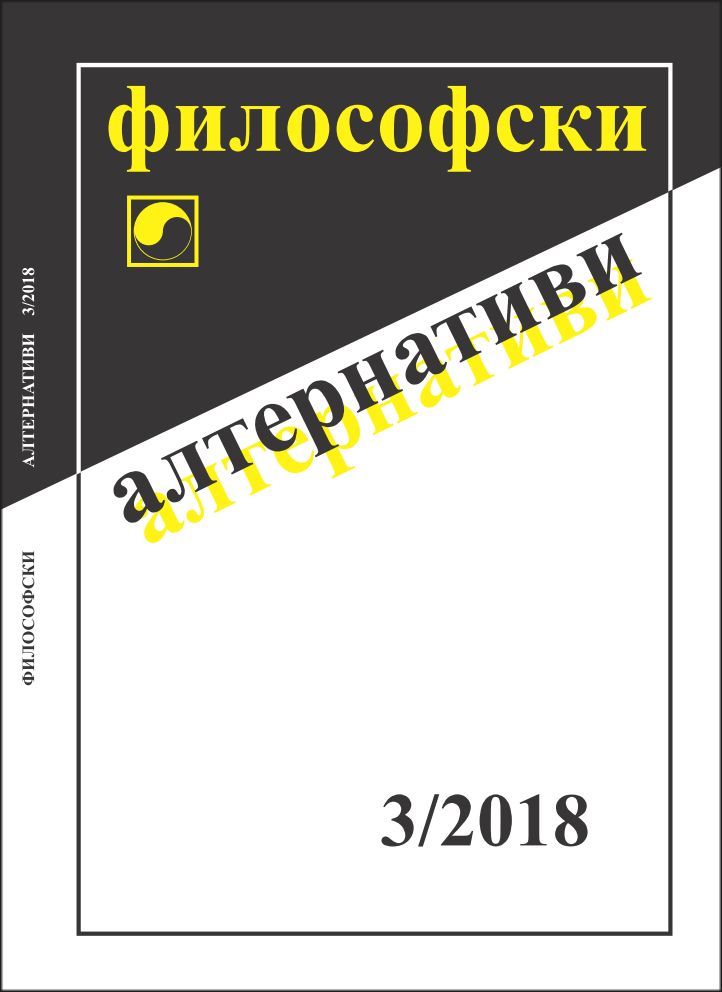
We kindly inform you that, as long as the subject affiliation of our 300.000+ articles is in progress, you might get unsufficient or no results on your third level or second level search. In this case, please broaden your search criteria.

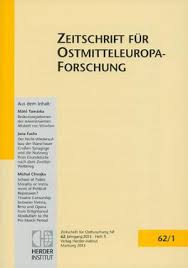
Die Frage der Stationierung der Roten Armee im Gebiet des ehemaligen Ostpreußen nach dem Zweiten Weltkrieg wurde bisher noch nicht im Rahmen einer soliden wissenschaftlichen Monographie bearbeitet. Bis vor kurzem verhinderten die Einschränkungen der staatlichen Zensur jegliche Beschäftigung mit dieser Thematik. Der Hauptgrund für diese Lage bestand aber in der Zugangssperre für Wissenschaftler zum geheimen Archivmaterial des kommunistischen Sicherheitsapparats. Diese Situation änderte sich erst um 1989/90, nach den politischen Umwälzungen in Polen und anderen Ländern Mittelund Osteuropas.
More...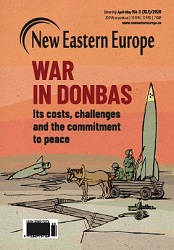
In late February 2014 the Russian incursion into Ukraine began on the Crimean Peninsula. By February 23rd, then Ukrainian President Viktor Yanukovych had disappeared from Kyiv. With his flight, Vladimir Putin’s man in Ukraine evaded accountability for the lethal use of force against the pro-European protesters on the Maidan during the Revolution of Dignity. The Kremlin’s propaganda machine portrayed Yanukovych’s escape to Russia and the subsequent instalment of an interim president by the Ukrainian parliament as a fascist coup d’état. As early as the day after his departure, Putin declared that measures would have to be taken to bring the Ukrainian Crimean Peninsula back into the Russian fold. When more and more Russian soldiers began appearing in Crimea during the last days of February, international reports spoke of “little green men”.
More...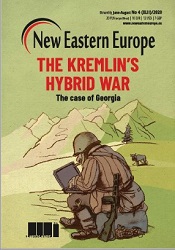
From the very early days of the global COVID-19 pandemic, discussions about how it will change the world began. The overwhelming majority of commentators of international affairs believe that Europe (and the rest of the world) will be a completely different place than before the coronavirus.
More...
The COVID-19 pandemic affected global markets in a very similar way to the 2008 financial crisis. According to the International Monetary Fund (IMF), the 2020 outlook does not project three percent growth anymore, but a sharp contraction of the same number (minus three percent), which will be worse than the loss in 2008. It is a clear threat for financial stability across the globe. Furthermore, it is important to emphasise that crisis management opportunities differ from region to region, creating greater challenges for countries lacking financial liquidity.
More...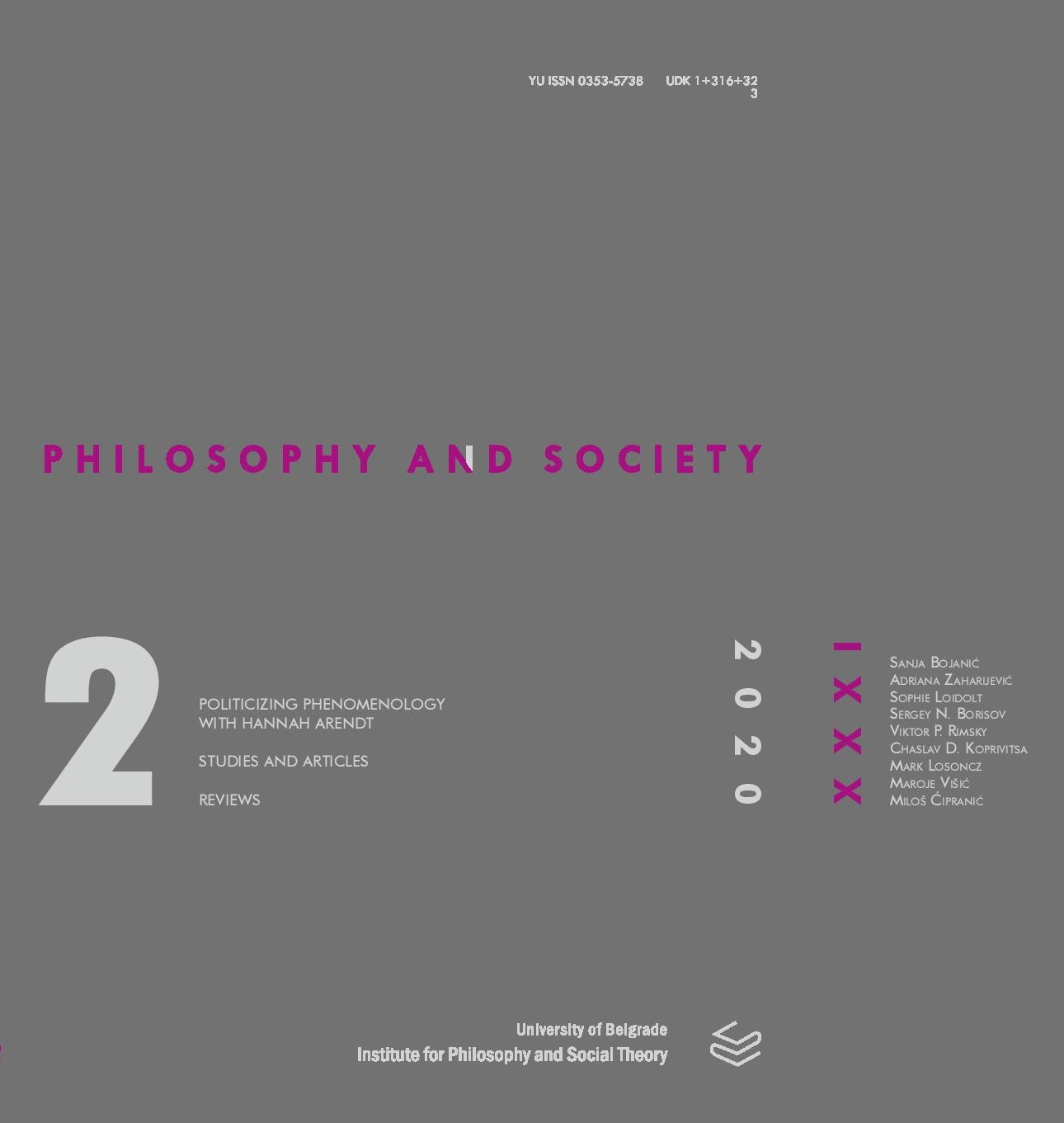
This short contribution is written on the occasion of the book discussion of Sophie Loidolt’s Phenomenology of Plurality: Hannah Arendt on Political Intersubjectivity (2018) at the Institute for Philosophy and Social Theory. It presents an attempt to read the two key notions Loidolt elaborates in her book – spaces of meaning and spaces of the public and private – from a critical perspective offered by Judith Butler’s taking up of Arendt’s work. Offering Butler’s conception of social ontology through several major points of contestation with Arendt, I argue against an all too simple reduction of her understanding of the political and normativity to poststructuralist ones.
More...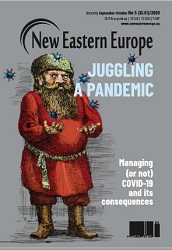
On August 9th, a consequential presidential election took place in Belarus. A few months prior, there was no indication that this year’s campaign would be radically different from any previous one. Everyone had assumed that the regime would simply register a few opposition candidates with no chance. After a typically uneventful campaign, President Alyaksandr Lukashenka would then claim another “elegant victory”. Perhaps a few protests were expected, alongside expressions of “deep concern” from the European Union and the United States. Belarusian political life would soon return to “normal” following the announcement of the results.
More...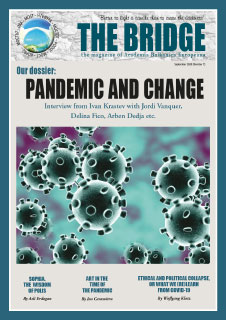
« THE BRIDGE » is offered in PDF format comprising always the full issue as one file, not divided into individual articles. Please take a look into the TABLE of CONTENT and into the EDITORIAL for authors and texts of your interest.
More...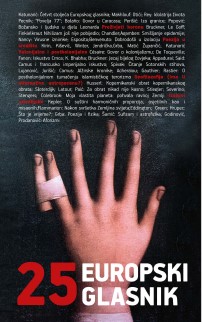
Civilizacija koja nije sposobna rješavati probleme koje stvara svojim djelovanjem, propada. Civilizacija koja bira zatvarati oči pred svojim najvažnijim problemima, boluje. Civilizacija koja izigrava svoja načela, umire. Riječ je o tome da takozvana »europska« ili »zapadna« civilizacija, oblikovana tijekom dva stoljeća buržoaskog režima, nije sposobna riješiti dva glavna problema koja je svojim postojanjem stvorila: problem proletarijata te kolonijalni problem. Takva se Europa nije u stanju opravdati pred sudom »razuma« ni pred sudom »savjesti«, pa stoga sve češće pribjegava licemjerju koje sve manje uspijeva zavarati i tim postaje sve mrskije. Europa je neobranjiva.
More...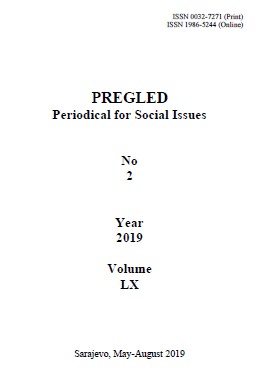
Politička teorija univerzitetskog profesora Esada Zgodića ima pluriverzičan karakter. Štaviše, rijeĉ je o politiĉkom teoretičaru koji je dao ogroman doprinos razvoju savremene politologije u bosanskohercegovaĉkom nauĉnom diskursu. Zgodićev politološki pristup je autentičan i nekonvencionalan u tematskom pogledu, a u njegovim studijama i knjigama problematizirane su i elaborirane teme iz razliĉitih politoloških subdisciplina. Drugim rijeĉima, njegov znanstveni aktivitet pripada raznolikim oblicima politiĉke teorije. Ipak, u najširem razumijevanju, njegova nauĉna bibliografija ima polarizacijsku i dihotomnu strukturu i, usto, moguće je konstatirati da je temporalno zasnovana i održiva.
More...
I am eighty years of age and still enjoy the privilege of writing, as this text is witness. Ever since my wife died almost four years ago, I have lived by myself in a large apartment in a Austro- Hungarian building constructed on the eve of the Great War and located on the most popular street in Sarajevo, Ferhadija, a pedestrian zone in the centre of town. The windows in the two largest rooms have a view of Trebević, a legendary hill that enfolds the southern side of the city. It’s spring, but I cannot feel its scent because a tiny virus from Wuhan has me under house arrest, which the authorities have merely legalised through regulations requiring all citizens older than 65 to remain in so-called self-isolation. I don’t feel lonely. On nice days I open my windows wide, and, exposed to the beneficent action of the sun, I watch the rare passers-by in their masks and gloves. The isolation itself is bearable and for many even welcome. People are taking stock and dealing with things outstanding for years. Difficulties, fear, and uncertainty lurk outside your home’s walls, because nobody can say what is happening or how long it will last.
More...
I am eighty years of age and still enjoy the privilege of writing, as this text is witness. Ever since my wife died almost four years ago, I have lived by myself in a large apartment in a Austro- Hungarian building constructed on the eve of the Great War and located on the most popular street in Sarajevo, Ferhadija, a pedestrian zone in the centre of town. The windows in the two largest rooms have a view of Trebević, a legendary hill that enfolds the southern side of the city. It’s spring, but I cannot feel its scent because a tiny virus from Wuhan has me under house arrest, which the authorities have merely legalised through regulations requiring all citizens older than 65 to remain in so-called self-isolation. I don’t feel lonely. On nice days I open my windows wide, and, exposed to the beneficent action of the sun, I watch the rare passers-by in their masks and gloves. The isolation itself is bearable and for many even welcome. People are taking stock and dealing with things outstanding for years. Difficulties, fear, and uncertainty lurk outside your home’s walls, because nobody can say what is happening or how long it will last.
More...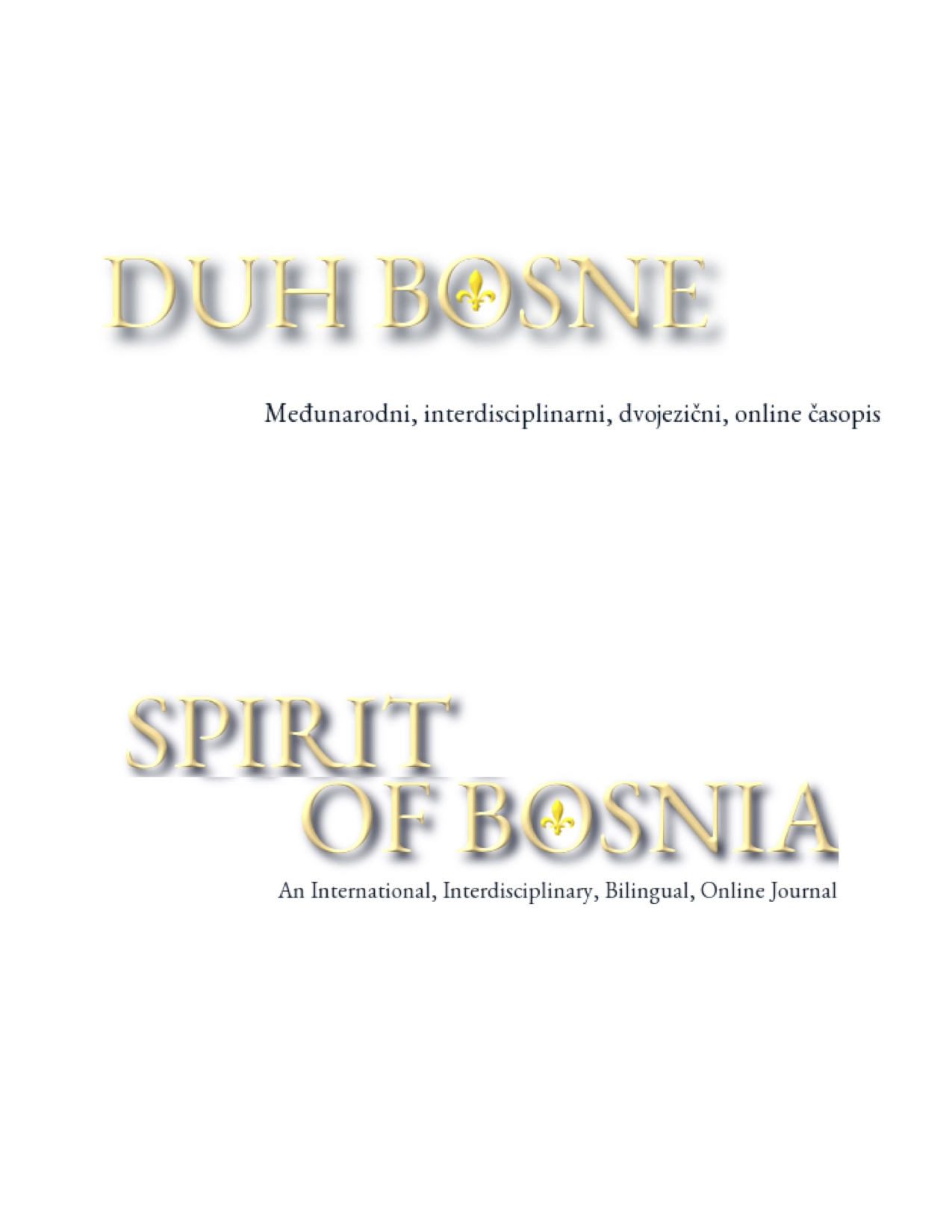
It is difficult to understand the executioners of the genocide in Srebrenica. What were they doing? Why were they doing it? What were they thinking? How could they have done what they did? In Srebrenica MCMXCV [2017], Emir Suljagić recounts a testimony from an executioner told to the International Criminal Tribunal for the former Yugoslavia after a massacre near Srebrenica in July 1995: From that pile, that heap of dead bodies that did not resemble human bodies any more, a human being emerged. I said human being, but it was actually a boy, five or six years old. It was unbelievable. Unbelievable. A human being came out and started walking towards a path, a path along which men were standing, doing their job, carrying automatic rifles… And then, out of nowhere they all put their guns down and all of them were just paralysed. And it was only a child in front of them. . . . And this child was covered in the tissue and intestines of other humans . . . And this child emerged from the pile of executed people, calling: «Babo»…. this is their word for father. The boy said, «Babo, where are you?»
More...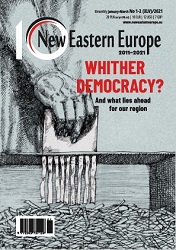
Parliamentary elections in Russia are about much more than just window-dressing. They serve to legitimise the authoritarian regime in the eyes of the public as well as verify the efficacy of the state administration machinery. The tangible unease among the Kremlin’s decision-makers, provoked by an unfavourable economic future and a worrisome evolution in the social mood, has accelerated efforts to consolidate authoritarian rule. New repressive laws, passed in 2020, are intended to ultimately suppress civic rights and freedoms and nip any forms of grassroots mobilisation in the bud.
More...
The political transformations that occurred in Moldova, Georgia and Ukraine in the second half of 2020 will have long-lasting consequences on the democratic development of these critical countries in the region. Each of them has made qualitative steps forward, leaving behind more oligarchic-centric rules of the game. In Ukraine, amid the territorial-administrative decentralisation efforts and electoral reform, the local elections brought to the frontline a new generation of locally grown politicians. They obtained more tools to counter-balance the big political parties in charge in Kyiv. Local democracy got a chance to shine, but long-term success depends on how the political newcomers can be protected from being subordinated by the oligarchs.
More...
During the two rounds of elections to the Seimas on October 11th and 25th, 141 parliamentarians were elected to represent Lithuania’s parliament for the next four years. The results of the elections show that the Homeland Union-Lithuanian Christian Democrats won the elections with the most seats (50) in the Seimas. The previous ruling party, the Lithuanian Peasant Popular Party, won 32 seats while the Social Democrats and the Liberal Movement received 13 mandates each. The Freedom Party, founded in 2019, won 11 seats, and the Labour Party won 10 seats. The new ruling coalition was formed by the Homeland Union, the Liberal Movement and the Freedom Party, which together secured a majority of 74 seats.
More...
In recent months we have seen numerous conferences, articles and discussions with a variation of the title “Belarus. An unexpected revolution”. Through them western analysts and policy-makers who were once calling Belarus the last dictatorship in Europe, are now looking for answers on whether and when the people’s revolution will succeed. They typically start their analysis with questions such as “Why now?” or “Where did this sudden awakening of the Belarusian society come from?” In their search for answers they often omit what is really of essence.
More...
The conditions that Bulgaria has set ahead for its much smaller neighbour include an official acknowledgement of having a common history, a change in the formulation describing the official language (Macedonian) which is being used in North Macedonia, and a roadmap for the implementation of a friendship treaty that the two countries signed in 2017. Bulgaria has also requested that the agreement includes Skopje’s renunciation of claims to the existence of a Macedonian minority in Bulgaria. Sofia often argues that Macedonian historical figures and landmarks are actually Bulgarian and that North Macedonia’s authorities should accept this as historical truth.
More...
Democracies are defined by the holding of regular elections that are free and fair, resulting in an alternation of leaders and the orderly transition of power. A central characteristic of this process is that while electoral outcomes are unpredictable, the manner in which politicians are replaced is highly routinised. Donald Trump, however, is a maverick and rule-breaker the likes of which the United States has never seen before.
More...
In 2011 Joe Biden, as the US vice president during his visit to Moscow, said to Vladimir Putin: “Mr Prime Minister, I’m looking into your eyes, and I don’t think you have a soul.” Putin replied: “We understand one another”. This anecdote seems to be a prophecy of a rough co-existence without any signs of fondness. Clearly Putin and most of the current Russian political elite are very sceptical towards Biden. The Russian president was one of the last national leaders who congratulated Biden on his victory over Donald Trump.
More...